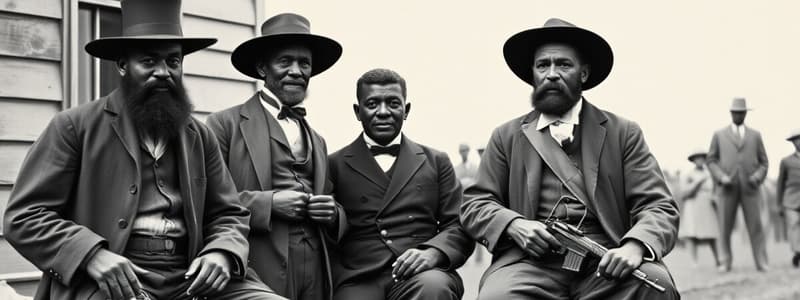Podcast
Questions and Answers
What were scalawags?
What were scalawags?
- Northerners who moved to the South
- White Southerners who joined the Republican Party (correct)
- African American voters
- Former wealthy planters
What was the purpose of the Freedmen's Bureau?
What was the purpose of the Freedmen's Bureau?
To provide food, clothing, hospitals, legal protection, and education for former slaves and poor whites in the South.
What was the Reconstruction period?
What was the Reconstruction period?
A period from 1865 to 1877 during which the United States began to rebuild after the Civil War.
Who led the Radical Republicans?
Who led the Radical Republicans?
What was Andrew Johnson's plan?
What was Andrew Johnson's plan?
What does the Fourteenth Amendment state?
What does the Fourteenth Amendment state?
What does the Fifteenth Amendment prohibit?
What does the Fifteenth Amendment prohibit?
Who were carpetbaggers?
Who were carpetbaggers?
Who was Hiram Revels?
Who was Hiram Revels?
What was sharecropping?
What was sharecropping?
What were the goals of the Ku Klux Klan?
What were the goals of the Ku Klux Klan?
Flashcards are hidden until you start studying
Study Notes
Scalawag
- White Southerners who aligned with the Republican Party post-Civil War.
- Many were small farmers seeking better economic conditions and opposing the power of wealthy planters.
Freedmen's Bureau
- Established by Congress in 1865 to assist former slaves and impoverished whites in the South.
- Provided essential services like food, clothing, hospitals, legal aid, and education.
Reconstruction
- A significant period of rebuilding and political reform in the United States from 1865 to 1877.
- Aimed to reintegrate Southern states and address issues arising from the Civil War.
Radical Republicans
- A faction within the Republican Party, led by Charles Sumner and Thaddeus Stevens.
- Focused on diminishing the political influence of former slaveholders and championing civil rights for African Americans.
Andrew Johnson
- Served as President after Lincoln, proposing a Reconstruction plan nearly identical to Lincoln's.
- Differentiated by efforts to weaken planter influence by barring high-ranking Confederates and wealthy landowners from voting.
Fourteenth Amendment
- Enacted to ensure that states could not deny rights and privileges to any U.S. citizen.
- Expanded citizenship definition to include all born or naturalized individuals within the U.S., countering the Dred Scott decision.
Fifteenth Amendment
- Ratified in 1870, it prohibited voting discrimination based on "race, color, or previous condition of servitude."
- Viewed as a crucial victory for the Radical Republicans in their fight for African American rights.
Carpetbagger
- Term for Northern migrants to the South following the Civil War, viewed negatively by Southerners.
- The name originated from the stereotype that these individuals were poorly equipped, carrying their belongings in carpet bags.
Hiram Revels
- First African American senator in U.S. history, elected during Congressional Reconstruction.
- Notable for being one of only 16 African Americans elected out of 125 Southerners during this period.
Sharecropping
- Economic system where landowners assigned small plots of land to heads of households along with seeds and tools.
- Often led to cycles of debt and poverty for sharecroppers, who were mostly African American.
Ku Klux Klan
- A secret society founded in the South aimed at undermining the Republican Party and its Reconstruction governments.
- Actively sought to suppress African American political rights and support the planter class through intimidation and violence.
Studying That Suits You
Use AI to generate personalized quizzes and flashcards to suit your learning preferences.


